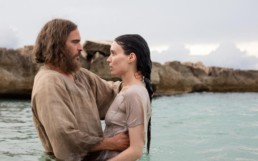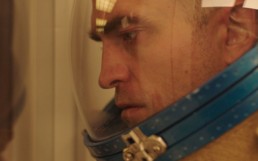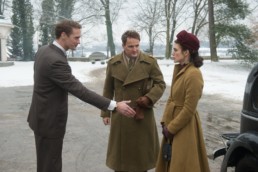'Mary Magdalene' Review: Quietly Captivating Biblical Drama
MARY MAGDALENE (2019)
Starring Rooney Mara, Joaquin Phoenix, Chiwetel Ejiofor
Directed by Garth Davis
Distributed by IFC Films. 120 minutes. Rated R
Straight off of Lion- Garth Davis' Oscar-nominated directorial debut that physically moved me to tears- comes Mary Magdalene, another emotional drama that brings the story of the apostle (or mythical apostle, depending on who you ask) Mary Magdalene to light for the first time. Aside from the film's visual beauty, it's important to note that Mary Magdalene is the last film score by the incredibly gifted composer, Jóhann Jóhannsson.
The film opens on a shot of a woman drowning, her wavering, sinking body looking more like an underwater ballet than a death. This imagery is strong, but should not be taken literally. It is made to resemble Mary's (Rooney Mara) suffocation at the hands of her father, her arranged marriage, and her lack of a sense of purpose. Mary is beautiful and headstrong, two qualities that aren't compatible with her time, and so all she can do is pray for change. When news spreads that a mysterious man named Jesus (Joaquin Phoenix) has come into town, claiming he knows the path to God's kingdom, Mary finally sees a way out. Without hesitation, Mary follows her faith and blindly follows Jesus and his disciples, including Peter (Chiwetel Ejiofor), on his journey to preach the word of God.
Mary falls under the spell of the bearded messiah after witnessing him heal the blind and bring people back from the dead, but it is their intimate, abstract discussions that bond the two. There is no romance between Jesus and Mary, it is purely platonic (off-screen, however, Phoenix and Mara found love on the set). Mary is there with Jesus until the very end as he hung lifeless on the cross. She was there when he was buried in the tomb made of rocks. And she was the first person to witness his resurrection.
Rooney Mara's ethereal beauty and wide-eyed innocence are natural features that make her the perfect Mary. She re-teams with Garth Davis and delivers a simmering performance. From Jesus to the Joker in a matter of months, Joaquin Phoenix flexes his range as an actor as the proverbial Son of God. This film proves that he really can do it all.
Throughout the film, Davis is respectful to the religion and the beliefs of Christians, handling the crucifixion and miracles with sensitivity. He even goes so far as to dispel the popular "rumor" that Mary Magdalene was a prostitute. In one of the title cards at the end of the film, a statement reads this was a "misconception" started by Pope Gregory in 591 AD.
Believer or not, there is a quiet captivation in Mary Magdalene that audiences will find themselves lost in, be it the picturesque surroundings, Mara and Phoenix's chemistry, or the gift of hearing Jóhann Jóhannsson's final musical score one last time.
Mary Magdalene opens this Friday at Laemmle theaters, on VOD and digital platforms April 19
'High Life' Explores Humanity in Isolation
Robert Pattinson's reinvention into an indie darling has been an exercise in pushing artistic boundaries and audience expectations. It may seem like Pattinson- the blockbuster heartthrob- was a whole other person. Maybe at this point, he is. Proving that he's not one to shy away from obscure projects, (see: Good Time), Pattinson joins forces with famed French director Claire Denis in the brain-busting sci-fi, High Life, a film whose meaning is obtuse but whose beauty is undeniable.
High Life is a story about isolation, survival, and rebirth. Set in deep space, we follow Monte (Pattinson), a convicted criminal who forgoes a traditional prison sentence to serve out his time as a pawn on a spacecraft as part of a governmental experiment. Monte and a handful of other unlucky men and women – including girlfriend Boyse (Mia Goth) – are to spend years in space, with the main objective of harnessing energy from a deadly cosmic vortex (a seemingly monumental task, especially for criminals with little to no education). Taking advantage of the offenders' vulnerability and circumstance, the crew's leader, Dr. Dibs (Juliette Binoche) has other plans for the space convicts. In the film's more risqué moments, we see her personal aim of achieving fertility by using the reproductive parts of the passengers aboard, with or without consent.
It should be mentioned, all of the above is crucial backstory crucial to explain Monte's situation when we first meet him at the beginning of the film (High Life is told through a series of flashbacks). As High Life opens, we see that Monte is apparently the only living person aboard the spacecraft – except for Willow, his infant daughter (played by 14-month-old Scarlett Lindsey). Kudos to the baby wrangler and Pattinson himself for creating such a warm and comfortable environment for baby Lindsey to thrive in. A sci-fi Cast Away of sorts, Monte no doubt has learned how to care for both him and his daughter over the years of living in isolation, much of his survival dependent upon the spacecraft's flourishing and vivacious garden.
Meditative and esoteric, High Life is definitely a thought-provoker. It is another ambitious output from Denis, who is known for her highly-cerebral and challenging films. But despite these accolades, High Life is still a challenge to watch. There are questions never answered that can lead to confusion, at times I wondered if I was missing something. The biggest takeaway from High Life is that an open mind should be brought aboard this odyssey.
Make sure you stay through the end credits, audiences are treated to Robert Pattinson's vocal arrangement in Tindersticks' song, "Willow"- the film's end track. It's a catchy, moody tune that perfectly sums up the vibe of the film- a unique production that demands a second listen to fully appreciate all of the little gems buried in this treasure trove.
High Life is rated R for disturbing sexual and violent content including sexual assault, graphic nudity, and for language. 110 minutes. Opening this Friday at ArcLight Hollywood and The Landmark.
'Slut in a Good Way' Review: Life's Short, Have Fun
A French-Canadian teenager takes her power back after a stereotypically degrading insult in director Sophie Lorain's progressive, sex-positive comedy, Slut in a Good Way. This black and white mumblecore film explores the strength of female friendships during the pivotal time in a young girl's life when both personal and sexual freedom is explored and discovering the freedom of being comfortable in one's own skin.
The film begins with a long one-take of three giggling girls, Charlotte (Marguerite Bouchard), Mégane (Romane Denis), and Aube (Rose Adam), as they rummage around a sex shop where Charlotte is deciding on which lingerie set to buy for her boyfriend. With input from her friends, she chooses an outfit, but unfortunately, the lingerie does little to spice up the 17-year-old's relationship, as Charlotte’s boyfriend decides to break up with her that night. Turns out, he prefers men. But that doesn't deter a headstrong Charlotte from trying to win him back, as she simultaneously self-medicates her heartbreak with booze, bongs, and best friends.
Each boy crazy in their own way, the girls can't believe how many handsome guys work at the local toy store, Toy Depot, and immediately apply for part-time jobs just to be in their company. Hoping to get her mind off her ex, Charlotte finds that flirting with the other boys at work is actually helping her move on. It is said that one way to get over someone is by getting under someone else, and Charlotte does just that. For a while, she feels more confident and self-assured, but when her co-workers begin slut-shaming her with the unfair double standard between her actions and those of her male partners, Charlotte becomes more insecure than ever.
Slut in a Good Way, previously titled Charlotte a du fun (aka Charlotte has fun) is an anthem to strong independent women who are not relying on having a boyfriend to feel complete. Director Sophie Lorain accomplishes this by never pointing a finger at Charlotte or insinuating that her trysts are mistakes. Rather, Lorain portrays the natural curiosity of a young woman who enjoys having sex without a moral judgment- something that is rarely supported onscreen. Once the stigma surrounding her sexuality is erased, Charlotte’s character is viewed as neither wrong or bad- in this case, “slut” is actually a term of endearment.
Lighthearted with a strong message behind it, Slut in a Good Way joins a growing number of films that are tackling progressive teenage sexuality, like Netflix's Sex Education and To All The Boys I've Loved Before. Slut in a Good Way is an upbeat and refreshing story, reminiscent of a modern-day version of Grease in some aspects, and another step toward the future of female-powered independent films.
89 minutes. Rated R for sexual content, drug use, drinking, and language - all involving teens. Opening this Friday at Laemmle Royal, Playhouse 7, and Glendale.
No Good Deed Goes Unpunished in 'Ash is Purest White'
A poetic romance that transcends time, Ash is Purest White tells a love story that doesn't play by the rules. Written and directed by Jia Zhang-Ke, the film is a tribute to the lengths one will go in order to reclaim a past relationship, despite the intangible longing of a love that's been lost. Ash is Purest White, which at the time of writing this review, currently holds a 100% on Rotten Tomatoes, shows that even though the truth may hurt, it is an absolute necessity in order to move on.
Sacrificing yourself for another
Qiao (Tao Zhao) is in love with the local "jianghu" (mafia) boss Bin (Fan Liao), and even though he is hesitant to put a label on their relationship, everyone who knows the couple knows they are together. One night, a mysterious murder in the group's inner circle puts everyone on edge, as town's rival gang appears to be sending threats. That threat becomes personal when a group of boys catch Bin off-guard and begin beating him in the middle of a busy street. Qiao, whose initial reaction of shock quickly turns into controlled rage, pulls out a gun- the gun that Bin gave her days prior- and shoots it up into the air as a warning. The rival group scatters, but unfortunately for our heroine, Qiao, she gets arrested for owning and discharging an illegal firearm.
Love lost
Fast forward five years, Qiao is finally released from prison and begins her search for Bin in the hopes to pick things up where they left off. The fact that Bin never came to visit her in prison and now is not answering his phone, makes her nervous. When Qiao finally tracks Bin down, his selfishness dumbfounds her. Not only does he have a new girlfriend, despite Qiao's sacrifice to save his life, but his feelings for her have also clearly changed. He doesn't love her anymore, and for Qiao, that reality is the equivalent of a slap in the face. She now realizes that her whole adult life, she had been a prisoner in both the literal sense and also figuratively as a pawn, in a non-committed relationship that had no future.
Lynchian moments make this a true art film
Almost Lynchian at times, Ash is Purest White incorporates surrealist moments that serve to shake up the film's otherwise natural sensibilities. The dance club scene early on, in which Qiao and Bin dance with a group of strangers to the Village People's YMCA, gives off strong Pulp Fiction vibes. Ballroom dancers at a funeral and a UFO sighting are other nuanced touches that director Zhang-Ke also incorporates. Visually, Ash is Purest White is drenched in the naturalistic beauty of the northwestern Chinese region where it looks as if every frame is a painting. The greenery of the hills juxtaposed with the neon vibrancy of city aesthetic breathes life into the tepid relationship we see on screen. The film also does a wonderful job of indicating that time is passing without relying on title cards or other obvious methods. We see our characters age through their wardrobe, hairstyles, and the continuous upgrades in the technology of the times.
Facing the truth is not easy, but necessary
Ash is Purest White is a film about life, love, and freedom where coming into one's own can be an ambiguous and anxiety-ridden journey. Qiao learns this the long and hard way as she discovers that she must live her life for no one other than herself. It's a lesson about self-discovery that's not only important but clearly timeless.
Ash is Purest White is not rated. 136 minutes. Opening this Friday at ArcLight Hollywood and Laemmle Monica Film Center.
'The Hummingbird Project' Review: Betting Millions on a Millisecond
Jesse Eisenberg and Alexander Skarsgård play cousins with money on their minds in the financial thriller The Hummingbird Project. Written and directed by Kim Nguyen, the film is an intoxicating look at high stakes’ corporate greed where the line between billionaire or broke is decided in one millisecond. The Hummingbird Project feels like a mix between the unnerving scheming of American Animals and the mile-a-minute repugnance of The Wolf of Wall Street... apparently, when it comes to money, we're all animals.
Setting the plan into motion
Vincent (Eisenberg) and Anton Zaleski (Skarsgård) are both top-level traders in NYC who have sights set far beyond their Wall Street cubicles. Vinny serves as the fast-talking mouthpiece while Anton is the more reserved, balding computer scientist. Together, they have the power to create big things, which is exactly what they've set out to do- disrupt the stock market. Enlisting help from their friend Mark (Michael Mando), the cousins have proposed a way to create an underground tunnel that runs a fiber-optic cable line from Kansas to New Jersey- approximately 1,000 miles long and 4 inches wide. The purpose of a project so large in scale and scope is fairly simple, to get stock market quotes a mere millisecond faster than other companies, including the company they abruptly left in order to pursue this project. All of this equates to stock market profits... and lots of it.
Competition arrives, and she's not happy
Everyone involved with the tunnel project is ecstatic, including the cousins' financial backer (Frank Schorpion). Expectations are high but Vinny's constant assurances and problem-solving skills put everyone's minds at ease. Plus, there is no visible threat or competitor to worry about…until there becomes one. Once the cousins' former boss, a tyrannical and vengeful Eva Torres (Salma Hayek), gets word of this project that threatens to cost her millions, she begins to put into motion a plan of her own that sets out to destroy Vinny and Anton. It becomes a true David vs Goliath situation with stakes that reach higher than any amount of money can buy.
Eisenberg and Skarsgård play satirical, yet realistically vulnerable, characters
The Hummingbird Project offers Eisenberg and Skarsgård dimensional and meaty characters that perfectly bounce off each other like a game of Pong. Better known for his roles as a heartthrob or "the other man," Skarsgård hides his usual charm behind a bald cap, wire-rimmed rectangular glasses, and an old robe as Anton. Unable to rely on his physical appearance alone, Skarsgård puts more emphasis on developing and expressing his emotions through the unspoken language of subtlety, like a furrowed brown or sly smile. Eisenberg sticks to his more traditional character style of fast-paced neuroticism, but a particularly emotional massage parlor scene paints him in a heartbreakingly vulnerable light. Without saying a word or line of dialogue, he unloads years worth of pent up stress, anger and sadness in a single moment. It is by far the most arresting and memorable shot in the entire film.
The hummingbird's relevance explained
16 milliseconds is equivalent to a single flap of a hummingbird's wing, and that is also the amount of time it takes to determine life or death in the un-relentless market economy. The goal is a mere millisecond, but throughout the turbulent journey of this tunnel project, Vinny learns that you can only push the edge so far until you reach the end, and by then it might be too late.
The Hummingbird Project is rated R for language throughout. 111 minutes. In theaters this Friday, including Arclight Hollywood.
'The Aftermath' Review: A Turbulent Love Story that Wallows in Sadness
A beautiful British woman falls in love with an equally handsome German man after an unwelcomed sexual advance wins her over in James Kent's latest, The Aftermath. A broody Keira Knightley and rugged Alexander Skarsgård star in this turbulent love story about following your heart, despite the consequences of their actions and disregard for all of the people this taboo relationship would hurt along the way.
Two attractive people meet. And quickly fall in love.
Set in 1940s Germany, post-WWII, Rachael Morgan (Knightley) and her husband of more than 11 years, an over-worked army colonel named Lewis (Jason Clarke), relocate from London to Hamburg so he can assist with post-war recovery. The large house they acquire already has two tenants living in it, German-born architect Stefan Lubert (Skarsgård) and his daughter, Freda (Flora Thiemann). Faced with this unexpected situation, Lewis makes the generous but controversial decision to allow the small family to stay. Stefan and his daughter keep to their quarters in the house's attic, hardly a livable space but apparently better than the alternative, while Lewis and his wife take over the rest of the house. The feelings of PTSD from the war, including the death of her young son and Lewis's absence for weeks on end, has led Rachael to feel extremely isolated. Feelings of paranoia also have her assuming that every German is an untrustworthy Nazi, which Stefan is clearly not. So this living arrangement is less than ideal for her. But two attractive people who both suffer from feeling lost and misunderstood can't suppress the sexual tension for long before one goes in for an unwarranted kiss, which is exactly what Stefan does.
The enemy becomes the lover
This seems to spark something in Rachael, and not feelings of #MeToo. She begins falling in love with "the enemy" behind her husband's back, the pair even going as far as having sex on the dining room table. After sneaking around their respective families and friends, the couple creates a plan to run away together but matters of the heart aren't always so simple, as the view from Rachael's rose-tinted glasses starts dimming to reveal the reality of her situation and a future that she will be putting in jeopardy.
Detailed sex scenes overcompensate for a lack of real connection
There's no way around it- The Aftermath is disappointing. With so much potential on screen and off, including the queen of conflict-ridden period pieces Keira Knightley and the always mesmerizing Alexander Skarsgård, this film misses the mark for a few reasons. It should be noted that the screenplay is based on the book of the same name written by Rhidian Brook, and like most adaptations, falls victim to rushed character development and story arcs. Rachael enters into this complicated relationship with strings attached as a married albeit unhappy wife, whereas Stefan's wife has since passed. For this reason, her actions come across as selfish and make it hard to sympathize with. Knightley's character left me feeling irritated, which is something I really didn't want to feel towards a woman who is clearly suffering. This is the film's biggest deterrent, but that's not to say there aren't "pleasurable" moments too. Without getting too graphic, the sex scenes are pretty out there (clearly, Kent was intent on showing audiences that Stefan really, really wants to please Rachael in more ways than one).
This wartime drama misses the mark
The Aftermath isn't the home run those associated with the film were hoping for, but it should be acknowledged for its portrayal of a rarely seen side of WWII. Aesthetically speaking, Kent has done a wonderful job in showing the beauty amidst the rubble, if only this film could have done the same.
The Aftermath is rated R for sexual content/nudity, and violence including some disturbing images. 108 minutes. Opening this Friday at ArcLight Hollywood and The Landmark.
'Transit' Review: Lying to Save Your Life
Would you lie to save your life? What if this lie meant losing the love of your life? These are the questions our protagonist is left to ponder in the German film Transit, directed by Christian Petzold. It's a classic story of fight or flight set against a dark backdrop of wartime uncertainty and one man's life-changing decision when he realizes that his survival is on the line.
Assuming a new identity for survival
Georg (Franz Rogowski) is a German refugee trapped in France due to the (purposefully vague- more on that later) occupation of Paris. He carries a couple of letters which he intends to deliver to a writer named Weidel in Marseilles- who we come to find out is actually deceased. With nothing more than the clothes on his back and a small wad of cash, Georg sneaks aboard a train heading to Marseilles. Once there, he attempts to deliver the letters to the local consulate when a mix-up occurs, and officers assume Georg to be the dead author. With this new identity comes a Visa, a passport, and most importantly, safety. What Georg didn't expect, however, was that he would fall in love with Marie (Paula Beer), the wife of the dead writer whose identity he has assumed.
Modern-ish look at events of the 1940s
Transit is poised as a modern adaptation of Anna Seghers' classic 1944 novel when the Nazi invasion of Europe was an imminent threat. And while Transit manages to capture the overall tone of era-depression, it is a confusing directorial choice to attempt to keep this time period "neutral." This past-meets-present-meets-timel
Certain directorial choices are questionable
Adapting a novel into a film inherently comes with a number of obstacles as well as criticism from the book's fanbase. Most importantly, how the director chooses to handle the impossible task of cramming hundreds of pages into an hour and a half can undoubtedly lead to rushed storylines or plot holes. The directorial choice to incorporate a third person narrator seems to be necessary, as this provides context and backstory to this fast-moving sequence of events. However, the revelation of the man behind the voiceover being the town's local bartender was a bit of a letdown which left me questioning who he was in relation to the story. How he would know what's going on when Georg is alone? It just doesn't click.
An unconventional leading man
Franz Rogowski is an interesting protagonist who broods at the right moments, and his internal confliction between his true self and faux self is the film's emotional strength. Rogowski's quirks, which include traces of a former cleft palate and a noticeable speech impediment, make him an unlikely leading man but this doesn't stop him from taking the bull by the horns and giving his all to this character- which requires more internal conflict than external. For a film based around a lie, Transit has a strong narrative foundation, however, the indistinguishable time period, along with other questionable directorial choices, play too melodramatic to be memorable.
Transit is 101 minutes. Not rated. Opening this Friday at the Laemmle Royal.
'Time For Ilhan' Review: Redefining American Politics
On Friday, March 8th, we celebrate International Women's Day with more optimism and determination than ever before. The rise of women taking control of their power and potential has been evident in the growing number of females in leadership roles, including in our government. In this arena, Alexandria Ocasio-Cortez may be a more recognizable household name but let us not forget other another woman of color who recently made history. The documentary Time for Ilhan shows Somali immigrant Ilhan Omar’s election into Congress and her determination to diversify and redefine the status-quo of politics in America.
Ilhan Omar made history with her election
Ilhan Omar is a living definition of the American dream. After her mother died when she was a child, the Somali government collapsed, and a civil war broke out. Ilhan found safety in a refugee camp until she was presented with an opportunity to start a new life in America, which she embraced whole-heartedly. Fast forward years later, Ilhan is 33-years-old, a wife and mother to three children, and ready to give back to the country that has offered her so much. Time for Ilhan covers the 2016 election season as she seeks to overthrow the current 43-year incumbent to become the new State Representative in Minnesota's Senate District 60B. Ilhan's story as an underdog immigrant who, against all odds, becomes the first person of Somali descent to be elected to Legislative Office in the United States is nothing short of inspiring.
Even with the odds against her, she prevailed
The odds were against her from the very start- being a woman, an immigrant, and a Muslim were qualities that scared off many potential voters at first but Ilhan is nothing if not resilient. This documentary, directed by Norah Shapiro, herself an award-winning female filmmaker, is a testament to the power we as individuals have to change the world. Regardless of gender, color, race, or religion, nothing is impossible when one sets their mind on a goal. To this point, I highly suggest sticking around after the film ends to watch the credits. This short montage is just as inspiring as the film itself.
The perfect film to watch on International Women's Day
Ilhan came to America as a refugee and now stands alongside other political heavyweights in Congress. Personal beliefs and party politics aside, her journey is one that should be admired, respected, and continuously told. Ilhan serves as an inspiration for all of those who have ever felt like an “other,” making it the perfect film to watch this International Women's Day.
Time For Ilhan is not rated. 89 minutes. Available on VOD and on DVD this Friday.








